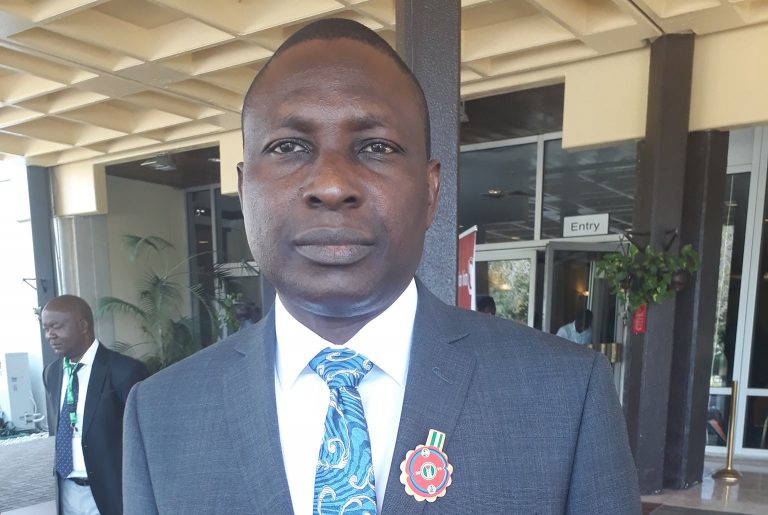Nigerians have kicked against the appointment of Olanipekun Olukoyede as the Economic and Financial Crimes Commission (EFCC) Chairman following to resignation of embattled Abdulrasheed Bawa.
Recall that on Thursday (12 Oct 2023), President Bola Tinubu appointed Olukoyede as the Chairman of EFCC pending Senate confirmation.
According to a statement signed by Ajuri Ngelale, President Tinubu’s spokesperson, Olukoyede’s appointment is in line with the law as established in section 2 (3) of the Economic and Financial Crimes Commission (Establishment) Act, 2004, that “the Chairman and members of the Commission, other than ex-officio members, shall be appointed by the President.”
Olukoyede’s appointment, according to Ngelale is for four years, following the resignation of the suspended Executive Chairman EFCC, Abdulrasheed Bawa.
“Furthermore, President Bola Tinubu has approved the appointment of Muhammad Hassan Hammajoda to serve as the Secretary of the Economic and Financial Crimes Commission (EFCC) for a renewable term of five years in the first instance, pending Senate confirmation,” the statement also read.
Reacting to the appointment, many Nigerians are of the opinion that Olukoyede ought not to be appointed chairman of the anti-graft commission, saying it is unlawful and illegal.
Some believe that he does not meet, at least, one of the three major criteria in the provision of section 2(1) of the EFCC (Establishment) Act, which requires the chairman to have “15 years cognate experience”.
They said he was suspended and never recalled by former President Muhammadu Buhari when he was Secretary to the commission alongside former Chairman, Ibrahim Magu.
READ ALSO | Gov’t Conducts Mass Wedding for 3,600 Young Girls, Boys in Kano
A Nigerian, through an anonymous message to CONVERSEER on Saturday (14 Oct 2023) said: “The appointment of Olukoyede as EFCC Chairman by PBAT is unlawful and illegal. It runs foul of the provisions of Section 2 of the EFCC ACT which requires that the person to be appointed as EFCC Chairman must amongst other things have;
- Been a serving or retired member of any security or law enforcement agency,
- Must have 15 years cognate experience of law enforcement, and
- Must not be below the rank of assistant commissioner of police
“Olukayode is a private legal practitioner and has never worked or belonged to any security or law enforcement agency as a member
“He does not have 15 years cognate experience as a law enforcement officer and
“His private legal practice years cannot be equated to the rank in law enforcement. Not enough attending seminal courses as a private legal practitioner can equate to 15 years of cognate experience contemplated by section 2 of the Act.
“He only had a stint as Chief of Staff of Magu and later became a Secretary of the Commission, all of which lasted for less than 6 years
“This government never cease to amaze Nigerians. Who knows, maybe he is being appointed for a mission. God help Nigeria.”
A Legal Practitioner, Liborous Oshoma, told Arise TV that the Tinubu Administration is trying to stand the law on its head.
He said: “The EFCC Act states that for an individual to qualify to be Chairman of the commission the individual must have attained at least the rank of Assistant Commissioner of Police or its equivalent and cognitive experience of 15 years. Mr Olukoyede’s experience as a private lawyer does not justify this appointment and should not be allowed to stand.”
Olukoyede's EFCC Appointment: Tinubu Administration is Trying to Stand Law on its Head – Oshoma
The EFCC Act states that for an individual to qualify to be Chairman of the commission the individual must have attained at least the rank of Assistant Commissioner of Police or its… pic.twitter.com/7SFYpyZnE7
— ARISE NEWS (@ARISEtv) October 13, 2023
Also, a Senior Advocate of Nigeria, Oba Maduabuchi, SAN, urged the Senate to throw out Olukoyede’s name, adding that he is not qualified.
“When did he join the police, army, navy, or any government security agency? You must have been an ACP for 15 years,” he said.
The Senate Should Throw Out The Approval Of Ola Olukoyede; He Is Not Qualified. – Oba Maduabuchi
When did he join the police, army, navy, or any government security agency? You must have been an ACP for 15 years.
Oba Maduabuchi, Senior Advocate of Nigeria pic.twitter.com/e2ADkJczuP— ARISE NEWS (@ARISEtv) October 13, 2023
A social commentator, Spotlight Abby took to X (formerly Twitter) to write: “3 things to know about the nominated EFCC Chairman:
- Prior to joining the EFCC, Olukoyede worked as a lawyer at the law firm of former Vice President Yemi Osinbajo.
- In 2020, Buhari suspended Olukoyede along with former EFCC acting Chairman, Ibrahim Magu from office and was never recalled till now.
- He is a pastor at RCCG.
“Which surprised you most?”
3 things to know about the nominated EFCC Chairman:
1. Prior to joining the EFCC, Olukoyede worked as a lawyer at the law firm of former Vice President Yemi Osinbajo.
2. In 2020, Buhari suspended Olukoyede along with former EFCC acting Chairman, Ibrahim Magu from office and was… pic.twitter.com/LiFLRhnmhm
— Spotlight Abby (@Spotlight_Abby) October 13, 2023
Another social commentator, Festus Ogun, said: “Tinubu’s appointment of Ola Olukoyede as the Chairman of the Economic and Financial Crimes Commission (EFCC) is illegal and unconstitutional. Olukoyede’s appointment clearly contravenes Section 2(1)(a) of the EFCC (Establishment) Act, 2004. He is not qualified.
“Section 2(1)(a) of the Act provides that a person appointed as Chairman of EFCC shall be a serving or retired member of any government security or law enforcement agency not below the rank of ACP or equivalent; and must possess not less than 15 years cognate experience.
“Mr Olukoyede is not a serving or retired member of any government security or law enforcement agency even though he was Ibrahim Magu’s Chief of Staff between 2016 to 2018. He has not ‘retired’ and is not a serving member of any security or law enforcement agency.
“Similarly, Mr Olukoyede does not possess 15 years cognate experience in any security or law enforcement agency. What is more? He is disqualified for appointment and ought not to have been appointed by the President. The appointment should be withdrawn immediately.”
Tinubu’s appointment of Mr. Ola Olukoyede as the Chairman of the Economic and Financial Crimes Commission (EFCC) is illegal and unconstitutional. Mr Olukoyede’s appointment clearly contravenes Section 2(1)(a) of the EFCC (Establishment) Act, 2004. He is not qualified.
— FESTUS OGUN (@mrfestusogun) October 12, 2023
On the other hand, some have argued that Mr Olukoyede ticks all the right boxes to be qualified as EFCC chair and that those who believe otherwise are only reading into the law what is not contained in it.
Section 2(2) of the EFCC Act identifies the secretary as a member of the commission. The provision designates the chairman and the secretary of the commission as the only permanent members, and others on the EFCC board as “part-time” members.










